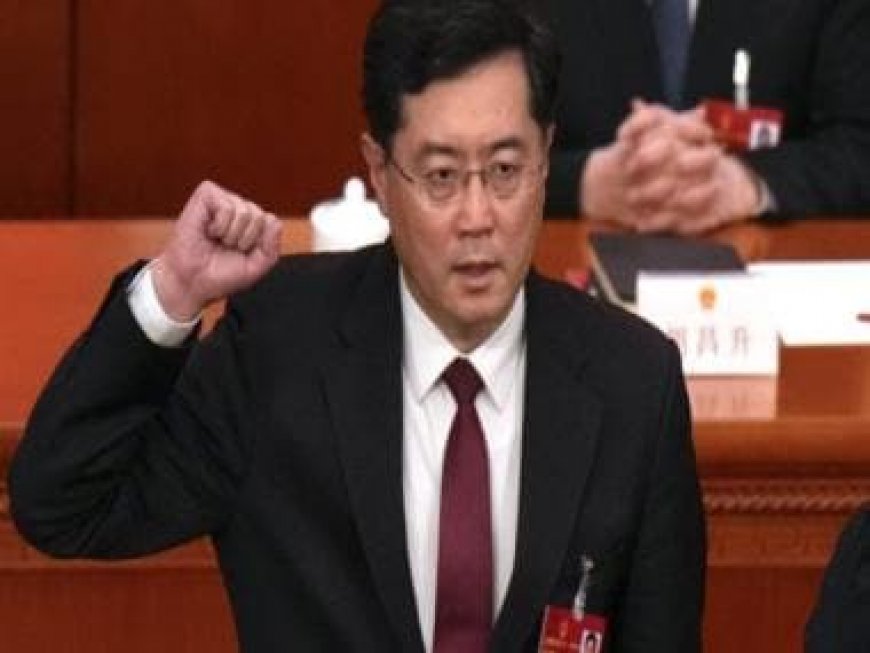China's former foreign minister has vanished but no official explanation yet
China's former foreign minister has vanished but no official explanation yet

Photos and mentions of the 57-year-old foreign minister began to vanish from his former ministry’s website hours after China’s top legislature called a special meeting to remove him last week.
However, Qin does not appear on the website’s list of “former ministers,” and for several more days, a search for his name had been returning the message, “Sorry, Qin Gang is not found,” even though part of this information had resurfaced days later.
In actuality, it has been almost a month since he last appeared in public.
The brief explanation from the foreign ministry a few weeks ago that this was due to health reasons—a statement later removed from official transcripts—has failed to quell the flurry of rumours about his whereabouts and how the entire saga affects President Xi Jinping, who helped him soar to fame.
Wang Yi, a seasoned diplomat, was appointed by China to succeed Qin, but little information regarding the shift was provided.
Beijing will promptly reveal facts surrounding Qin, according to spokeswoman for the foreign ministry Mao Ning, and it rejects “malicious hype.”
She was responding to a reporter who inquired about the transparency surrounding Qin’s departure. The ministry has received more than 25 inquiries in recent days addressing Qin at press conferences.
There will likely be more rumours as a result of Qin’s abnormally prolonged and inexplicable absence, his quick termination from his position, and other peculiar events like the ministry’s website.
After being appointed as one of the nation’s youngest foreign ministers in December 2022, a position with a five-year tenure, Qin served in the position for just over six months.
In China, cases of officials dissipating and being erased from memory have happened before.
Before it was reported that the previous year’s industry minister Xiao Yaqing was under investigation for corruption, he went missing for nearly a month.
The former senior protocol officer Zhang Kunsheng, who was convicted of corruption and using his position of authority to get sex in 2016, had all online references to him erased by the foreign ministry.
In China, such erasures date back many years.
Three times between 1955 and 1972, a state-commissioned artwork of Mao Zedong standing atop Tiananmen Gate to declare the creation of the people’s republic was changed to remove officials who later came into conflict with Mao.
However, according to other observers, it is not at all obvious in Qin’s case.
Despite having the authority to do so, the National People’s Congress Standing Committee, which met on Tuesday, did not eliminate Qin’s other position as State Councillor, a cabinet official with a higher status than a minister.
Analysts also note out that just a few months ago, Qin would have undergone a thorough screening process before accepting the position.
According to Communist Party laws, leaders are screened based on their political views, professional performance, and adherence to party rules. They must also disclose information about their families, such as whether they have lived abroad and what assets they have.
In an effort to combat corruption, Xi has established a plethora of rules to uphold party discipline since taking office in 2012. According to observers, these laws have strengthened members’ allegiance to Xi.
But if Qin’s removal is motivated by factors other than his health, the stakes are raised for Xi, especially given that his quick promotion through the ranks was partially ascribed to his proximity to the president.
When Qin was top protocol officer during Xi’s first term, a position that would grant him direct access to Xi whenever the latter met with foreign leaders, Xi became aware of him.
Then, in five years—bullet-train speed by Chinese standards—he made a treble jump from director of protocol to U.S. ambassador, then to foreign minister and state councillor.
Analysts claim that most of the ultimate leadership team for Xi’s historic third term in office was composed of people he has previously worked with and has confidence in.
Prior to compiling a list of candidates for a larger group of party delegates to publicly support, Xi abandoned the custom of allowing current and retired top leaders to vote on probable candidates.
Instead, the names were chosen under Xi’s “direct leadership” after he personally spoke with others and visited with potential candidates.
(With agency inputs)
What's Your Reaction?

























































